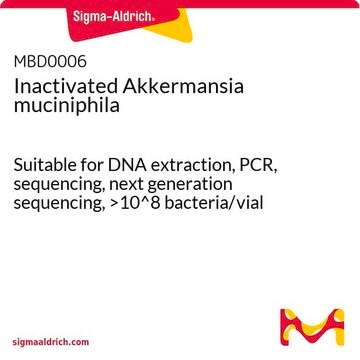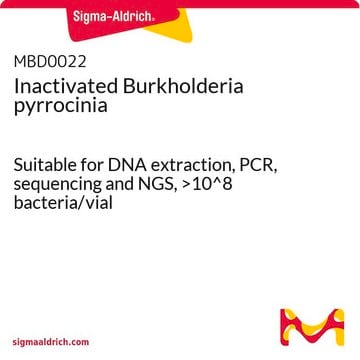MBD0001
Microbial DNA standard from Akkermansia muciniphila
Suitable for PCR, sequencing and NGS, 10 ng/μL
About This Item
Javasolt termékek
Minőségi szint
form
liquid
koncentráció
10 ng/μL
technika/technikák
DNA extraction: suitable
DNA sequencing: suitable
PCR: suitable
kiszállítva
ambient
tárolási hőmérséklet
−20°C
Related Categories
Általános leírás
Akkermansia muciniphila is a gram negative, anaerobic, non motile, non spore forming and oval shaped bacterium. A. muciniphila inhabits the gastrointestinal tracts of more than 90% of adults and constitutes 1 to 4% of the fecal microbiota.2 A. muciniphila level was suggested to be a biomarker for a healthy intestin. 3
A. muciniphila degrades mucus and utilizes it as a carbon/nitrogen source. Consequently, the host produces additional mucus while the bacterium produces oligosaccharides and Short Chain Fatty Acids (SCFAs) that can be utilized by the host and trigger the immune system. An additional protective effect of the SCFA is stimulation of mucus-associated microbiota growth, that serves as a barrier against penetration of pathogens to intestinal cells. 2,4
Read here how to use our standards to ensure data integrity for your microbiome research.
Alkalmazás
Tulajdonságok és előnyök
- Individual microbial standard for microbiomics and meta-genomics workflow
- Suitable standard for PCR, sequencing and NGS
- Improve Bioinformatics analyses
- Increases reproducibility
- Compare results lab to lab
Fizikai forma
Egyéb megjegyzések
Tárolási osztály kódja
12 - Non Combustible Liquids
WGK
WGK 1
Lobbanási pont (F)
Not applicable
Lobbanási pont (C)
Not applicable
Analitikai tanúsítványok (COA)
Analitikai tanúsítványok (COA) keresése a termék sarzs-/tételszámának megadásával. A sarzs- és tételszámok a termék címkéjén találhatók, a „Lot” vagy „Batch” szavak után.
Már rendelkezik ezzel a termékkel?
Az Ön által nemrégiben megvásárolt termékekre vonatkozó dokumentumokat a Dokumentumtárban találja.
Cikkek
DNA standards enhance metagenomics research integrity, offering precise species study and mixed community standards.
A DNS-szabványok fokozzák a metagenomikai kutatások integritását, pontos fajvizsgálatot és vegyes közösségi szabványokat kínálva.
Tudóscsoportunk valamennyi kutatási területen rendelkezik tapasztalattal, beleértve az élettudományt, az anyagtudományt, a kémiai szintézist, a kromatográfiát, az analitikát és még sok más területet.
Lépjen kapcsolatba a szaktanácsadással








